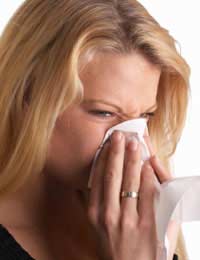Bacterial Infections

It's distressing enough to deal with the symptoms of hay fever, but many people don't realise that the resulting irritation and weakened immune system can also leave them more susceptible to a secondary infection.
Inflamed tissues in the ears nose and throat can create a haven for bacterial infections to thrive and the combination of a bacterial infection alongside hay fever can leave you feeling really miserable and overwhelmed with a multitude of painful symptoms.
Treating Hay Fever
The best way to prevent a bacterial infection that occurs as a complication of hay fever is to prevent hay fever from occurring in the first place. This means adopting a prevention plan, which will likely include strategies such as monitoring the pollen count, avoiding times of the day when the pollen count is high and avoiding any other specific triggers you might have.Immunotherapy based treatments can also help you to handle your hay fever and strengthen your immune system, so that your susceptibility to hay fever is reduced. In turn, this will also help to prevent a secondary infection. Topical and oral medications can alleviate hay fever symptoms by reducing irritation in the eyes, nose and throat, which helps to reduce the chances of a bacterial infection.
Ear Infection
Ear infections can result from hay fever, especially when symptoms are chronic. The ear canal can become inflamed from swelling that occurs as a symptom of hay fever. The swelling may then interfere with drainage in the ear. If bacterial discharge blocks the ear, infection can occur. Children are particularly susceptible to ear infections, so a child who has hay fever must take extra care to treat the hay fever symptoms to prevent them from becoming chronic.Symptoms of an ear infection may include:
- Fever
- Discharge from the ear
- Dizziness
- Stuffed feeling in the ears
- Difficulty hearing
Sinus Infection
A sinus infection is a bacterial infection in one of the sinuses that drain into the nose. Hay fever can block the sinus, leading to congestion and subsequently, an infection may occur. Sinus congestion often will go away on by itself but if bacteria multiply within the sinus, an infection can occur.Some of the symptoms that can indicate a sinus infection are:
- Pain in the face
- A yellowish or green coloured nasal discharge that persists
- Facial swelling around the sinus area
- Fever
Complications of hay fever such as bacterial infections can leave you feeling poorly, but medications can help to treat the discomfort associated with the infection. Ideally, you should see your doctor for hay fever treatment because chronic hay fever symptoms will put you at a higher risk for complications. Early treatment not only benefits you by reducing painful hay fever symptoms, but it can also keep bacterial infections at bay.


Re: Common Symptoms Of Hay Fever
Few months ago I had anelegic reaction in under my eyes so I was prescribed steroids antihistamine they worked. Then few weeks…
Re: Rebound Nasal Congestion
I recently had a rhynectomy for sac since the operation I have been suffering from a severe blocked nose any body offer any advice
Re: Tree Pollen
Tender lymph glands in your neck under your chin are a sure sign of the body reacting to tree pollen. My glands have been tender since January but,…
Re: Tree Pollen
Does anyone know if Hawthorn causes hayfever please? We have a lot of Hawthorn at the bottom of our garden and I'm really suffering at the moment with…
Re: Tree Pollen
Having not really suffered from any Hayfever symptoms since 1988, I can honestly say that I have never felt so rough as I have these last 6-7 weeks. So…
Re: Tree Pollen
Do conifer trees cause big hayfever allergies? Massive conifer in our front garden which we have watched spewing out pollen for weeks, coating cars. I…
Re: Tree Pollen
I developed tree pollen allergy about fifteen years ago in my mid thirties. I had desensitisation injections for 3 years at Southmead hospital in my…
Re: Tree Pollen
I have been suffering from seasonal tree pollen hayfever for the past few years and in response to Katy, the timing of your discomfort is probably…
Re: Tree Pollen
First year I have experienced hay fever.started feeling rough in March sore throat and uvlia, had a large rash on upper torso.blocked nose in morning
Re: Tree Pollen
My hay fever is the worst it has ever been and I have been unable to go outside for over a week now or open a window. Just to get out of bed in the…